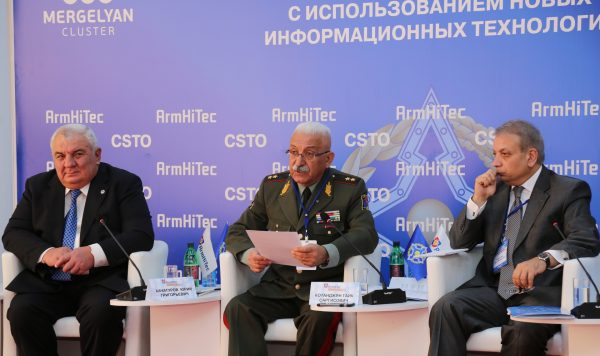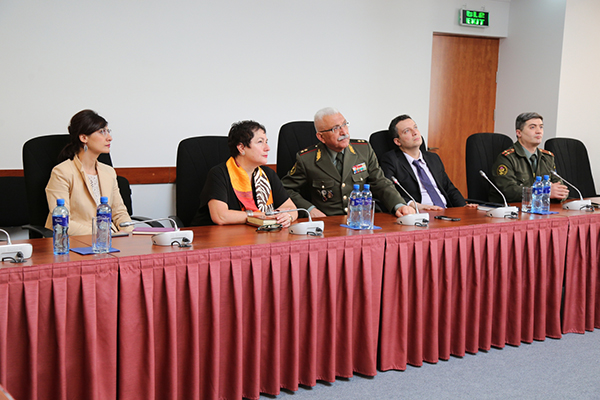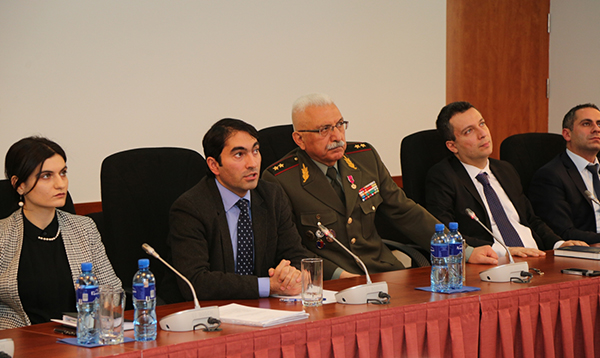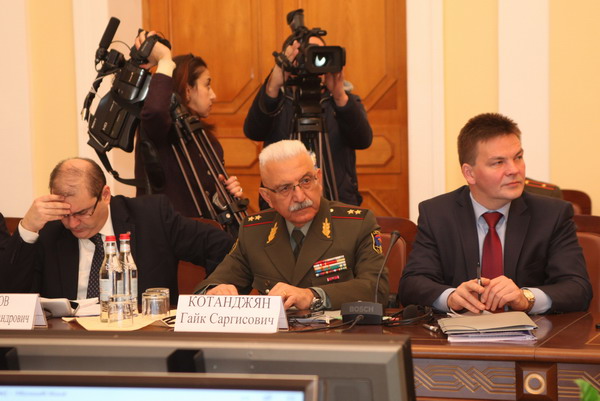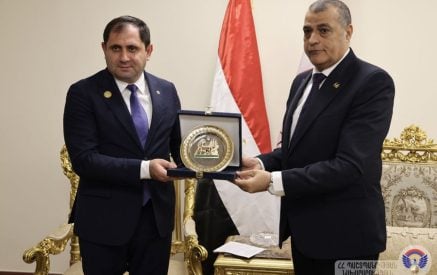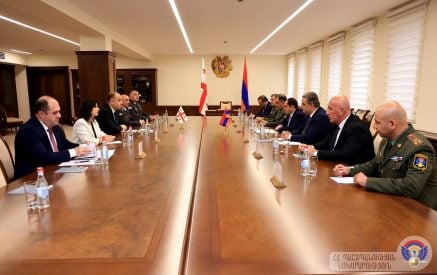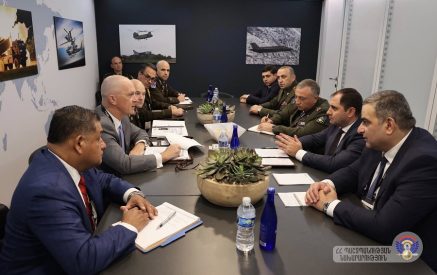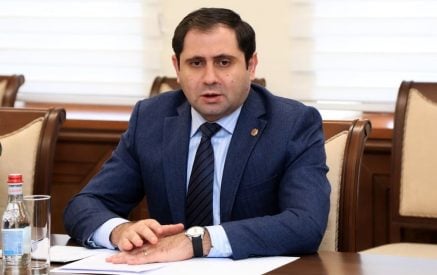On October 15, 2016, under the auspices of the Session of the CSTO Collective Security Council the International Conference dedicated to the issues of information security with the use of new information technologies of the CSTO Member States was held in Yerevan with participation of senior officials of the CSTO Member States and experts dealing with issues of information security.
The Secretary of the National Security Council of the Republic of Armenia Yuri Khachaturov and the Deputy Secretary General of the CSTO Ara Badalyan welcomed participants of the Conference. The first session of the Conference “Political and Technological Guidelines for Developing Information Security Strategy in the Interests of the CSTO” was chaired by the Head of the National Defense Research University (NDRU), Member of the CSTO Academic-Expert Council, Doctor of Political Science, Professor, LTG Hayk Kotanjian. Dr. Kotanjian also delivered a presentation during the session.
In his presentation “Complementarity in Developing the National Cybersecurity Strategy of the Republic of Armenia: Relevance of a Strategic Forum on Cooperation in Cyberspace” Dr. Kotanjian stated that the Conference on information security issues is the logical continuation of the quest for intersection of political and technological aspects of the Republic of Armenia’s strategic interests in cybersecurity in the context of its external security complementarity policy regarding both allies and Member States of the CSTO and partners from the NATO “Partnership for Peace” Program. He stressed that adhering to the principle of conducting a multi-vector foreign policy reflecting the realities of the Republic of Armenia’s geostrategic position, the Institute for National Strategic Studies of the National Defense Research University continues its academic-expert cooperation with the Russian, as well as the US advanced academic centers such as the Information Resources Management College of the US National Defense University and the Harvard University Program “Cybersecurity: The Intersection of Policy and Technology”.
Under political-diplomatic tensions between the U.S. and the Russian Federation the National Defense Research University figures as one of academic platforms in organizing strategic forums in an academic-expert format for the discussion of the most pressing problems of security dynamics in the explosive region.
Read also
The National Defense Research University based on the results of cooperation with its partners finalized the Draft of the National Cybersecurity Strategy working in favor of Armenia’s integration into the agile process of forming a unified control system for cybersecurity dynamics at international, national, corporate and private levels of dialogue, and cooperation with its allies and partners.
Concluding his presentation, Dr. Kotanjian forwarded a proposal to devote the International Strategic Forum of 2017 of the National Defense Research of University of Armenia to the “PROSPECTS FOR DIALOGUE AND COOPERATION IN THE FORMATION OF CYBERSECURITY SYSTEM: THE INTERSECTION OF POLICY AND TECHNOLOGY”. He stated that the National Defense Research University, having experience in using this academic platform for the discussion of topical issues concerning security dynamics of the region not solely in political, but in academically-mediated, academic and expert format, is ready to address a proposal to the United Nations, to the partner think-tanks of the CSTO and NATO states for the joint organization of the Forum.
During the Conference, presentations were made by the Head of the Department for Information and Information Technology Security of the Office of the Security Council of the Russian Federation Sergei Boyko; Head of the Response Services for Computer Emergency of the Republic of Kazakhstan Zhanat Zhakupov; Deputy Head of Department of the Center for Information Protection and Special Communications of the Federal Security Service of the Russian Federation Igor Savasteev; Division Head of the Operational and Analytical Center under the President of the Republic of Belarus Anatoly Matveev, other senior officials and experts in information security of the CSTO member states.
Presentation of the Head of the National Defense Research University (NDRU), Member of the CSTO Academic-Expert Council, Doctor of Political Science, Professor, LTG Hayk Kotanjian at the International Conference Dedicated to the Issues of Information Security with the Use of New Information Technologies of the CSTO Member States. October 15, 2016, Yerevan.
COMPLEMENTARITY IN DEVELOPING THE NATIONAL CYBERSECURITY STRATEGY OF THE REPUBLIC OF ARMENIA: RELEVANCE OF A STRATEGIC FORUM ON COOPERATION IN CYBERSPACE
Dear colleagues!
I have the honor to greet you on behalf of our Institute for National Strategic Studies of the National Defense Research University (INSS, NDRU),[1] which in June 2013, at its international academic Strategic Forum facilitated the development of strategic guidelines for the Collective Security of the CSTO. The Forum was organized with participation of the CSTO Secretary General Mr. Nikolay Bordyuzha, allies from Belarus, Kazakhstan, Kyrgyzstan, Tajikistan, partners from the OSCE Minsk Group Co-chair states – the U.S. and France, as well as other Member States of the NATO “Partnership for Peace” Program.
Remarkable that today’s conference is held under the auspices of the CSTO Collective Security Council’s session convened to come up with a decision on the approval of “The CSTO Collective Security Strategy for the period up to 2025” developed based on academic-expert recommendations of the mentioned Strategic Forum of our Institute.
This session of the CSTO Conference on information security issues is the logical continuation of the quest for intersection of political and technological aspects of our state’s strategic interests in cybersecurity in the context of external security complementarity policy of the Republic of Armenia regarding both allies and Member States of the CSTO and partners from the NATO “Partnership for Peace” Program. It should be stressed that our Institute, while studying cybersecurity problems, does not deal with elements of information security content associated with propagandistic aspects of state institutions’ and NGO activities.
It is important to note that today with certain parity of varying degrees in the use of conventional weapons and weapons of mass destruction among the militarily and economically leading world states and with the international law setting out the main principles of relations between them within such spaces as the land, sea, air, and space, the question of interstate parity and relations in cyberspace at the moment largely remains uncertain and open.
As we know, in the formation process of the global cyberspace, convergence of military and civilian computer technologies takes place, new tools and methods of active influence on the information infrastructure of potential adversaries are intensively developed, various specialized public institutions, cyber think-tanks, and business organizations are established in leading foreign countries.
From this point of view, the global informatization and the formation of the supranational cyberspace – a sovereignty over which is not established by agreed rules of conventional international law delineating the boundaries of the nation-states – determine the directions of the quest for international legal tools that would regulate cybersecurity at the level of the UN international consultations. In this sense the exchange of ideas among professionals at academic and expert fora, like our Conference, becomes important.
Adhering to the principle of conducting a multi-vector foreign policy reflecting the realities of the Republic of Armenia’s geostrategic position, the Institute for National Strategic Studies of the National Defense Research University continues its academic-expert cooperation with advanced academic centers of the U.S. such as the Information Resources Management College (iCollege) of the National Defense University and the Program “Cybersecurity: The Intersection of Policy and Technology”.[2]
Under the known political-diplomatic tensions between the U.S. and the Russian Federation, whenever possible, our organization figures as one of academic platforms in organizing strategic fora in an academic-expert format for the discussion of the most pressing problems of security dynamics in our explosive region.
These quests for regulators have fundamentally changed the essence of ensuring the cybersecurity due to new challenges and modern military-political and strategic threats that do not face sovereign states and the international community, but require considerable responses. The information sphere as a backbone for governing the state and society actively influences the state of political, economic, defense and other fields in the Republic of Armenia. The active cooperation of the Ministry of Defense of Armenia with the CSTO, which has a mission to participate in ensuring stability and security in the region,[3] is noteworthy in the process of parrying the abovementioned challenges.
With the expansion of capabilities of cyber infrastructure, difficulties are increasing in various sectors of the public life, associated with the provision of critical infrastructure’s safe operation, cryptographic protection of information, promotion of international parity in this area, as well as the threats such as computer or cyber terrorism that aims to damage information and digital systems.
In recent years, important changes are taking place in the UN: in August 2016, the Report following the Meeting of the UN Group of Governmental Experts (GGE)[4] on international information security recognized that the international law is applicable to the field of ICT use, though it can be developed, if necessary, including through the adoption of new norms, including rules and principles concerning responsible behavior of states in the information space. The GGE composed of representatives from 25 countries, including the U.S., Russia, China, among others. It thoroughly and constructively discusses the questions of adapting, based on a consensus, the norms of international law in the cyberspace to national legislations – in order to develop rules of conduct for states and establish confidence-building measures.
Together with the mentioned facts, the availability of such a cyber infrastructure in any state necessitates the development of a national strategy and establishment of mechanisms for policy implementation that will reflect special regulations of procedures carried out by competent authorities and concerned actors to ensure cybersecurity. However, due to the wide use of information and communication technologies in the life of states and societies, the formation of e-society and the construction of e-government becomes reality. Such changes require coordinated organizational and technological measures and concerted actions of public authorities in the framework of a common state policy to shape a system of a unified cyber platform at the national level.
In this context, the close cooperation of Armenia – with separate states and international organizations that promote security in the South Caucasus region through exchange of information, knowledge, and experience in the field of cybersecurity at interstate and interagency levels – is particularly important.
Given the increasing threats and challenges associated with the radical spread of ICT, in recent years Armenia has taken effective steps for the development of this sector at the national level; at the same time cooperating with international partners, the country is involving in the global information community.[5] A good example of this is the fact that the next World Congress on Information Technology of 2019 will be held in Armenia. It should be noted that in close cooperation with the US National Defense University and Harvard University and based on the study of foreign countries’ experience the National Defense Research University of the Republic of Armenia developed a Draft of the National Cybersecurity Strategy of the Republic of Armenia to create a backbone for ensuring the republic’s cybersecurity. Academic consultations held between the Political Science Associations of Armenia and Russia play an important role in comprehending the limits of the multi-vector cooperation.[6]
Cybersecurity is currently gaining significance as a new branch of our military-industrial complex, designed to ensure the ultimate goal – the defense security of our country. The attitude towards its development should not acquire departmental, but national character. In other words, cooperation between relevant agencies, academia, and private business becomes a security imperative. In this sense, the timely planning and coordination of cybersecurity provision and information warfare at the global and regional levels become one of high-priority directions in the national security system of the Republic of Armenia and should have a significant impact on its progressive development.
The question of the need for a code of conduct in cyberspace around the global, regional, and national infrastructure of the Internet is actively discussed within expert and technical communities of the Republic of Armenia. Recently, our Institute spoke at the Yerevan International Scientific Forum on Internet Governance with proposals to address this integration problem on the basis of creating a consolidated system of cooperation between government agencies, as well as international and national private business organizations.
Based on the recommendations of the Harvard Program “Cybersecurity: The Intersection of Policy and Technology”, as well as on the results of cooperation with the Information Resources Management College of the partner U.S. National Defense University, the INSS-NDRU of Armenia finalized the Draft of the National Cybersecurity Strategy. In cooperation with its partners, our organization, following the principles of complementarity, works in favor of Armenia’s integration into the dynamic formation process of a unified control system for cybersecurity dynamics at international, national, and corporate and private levels of dialogue, and cooperation with its allies and partners.
This approach is consistent with national interests of the Republic of Armenia and can become a step forward in its international cooperation in the field of cybersecurity with its allies from the CSTO and partners from the NATO “Partnership for Peace” Program.
Our Institute has the honor to propose to devote the International Strategic Forum of 2017 of the National Defense Research of University of Armenia to the “PROSPECTS FOR DIALOGUE AND COOPERATION IN THE FORMATION OF CYBERSECURITY SYSTEM: THE INTERSECTION OF POLICY AND TECHNOLOGY”. Having experience in using this academic platform for the discussion of topical issues concerning security dynamics of the region not solely in political, but in academically-mediated, academic and expert format, we are ready to address a proposal to the United Nations, to our esteemed partner think-tanks of the CSTO and NATO states for the joint organization of the Forum.
NATIONAL DEFENSE RESEARCH UNIVERSITY, MOD, RA
[1] Institute For National Strategic Studies after Drastamat Kanayan MOD, RA. https://www.mil.am/en/institutions/60/p/person
[2] Dr. James Keagle, Academic consultant of the Armenia’s NDRU Project, Project Leader: Defense Education Enhancement (DEEP), Center for Technology and National Security Policy, INSS, NDU. https://ctnsp.dodlive.mil/staff/james-keagle/; LTG (r.), Tad Oelstrom, Academic consultant of the Armenia’s NDRU Project, Faculty Chair: Cybersecurity: The Intersection of Policy and Technology https://exed.hks.harvard.edu/Programs/cs/overview.aspx
[3] The Greeting Address of the Chairman of Political Science Association of Armenia Dr. Hayk S. Kotanjian to the 7th All-Russian Congress of Political Science on behalf of the Political Science Associations of the New Independent States. THE 60th ANNIVERSARY OF THE RUSSIAN POLITICAL SCIENCE ASSOCIATION: 1955-2015 THE 7th ALL-RUSSIAN CONGRESS OF POLITICAL SCIENCE, NOVEMBER 19-21, 2015: MOSCOW. Aravot. https://en.aravot.am/2015/11/24/173107/.
[4] The UN’s Group of Governmental Experts on Cybersecurity. Council on Foreign Relations. https://blogs.cfr.org/cyber/2015/04/13/the-uns-group-of-governmental-experts-on-cybersecurity/.
[5] Dr. Hayk Kotanjian. Managing Strategic Changes Through DEEP Reforms: A View from the Perspective of U.S.–Armenia “Smart Power” Cooperation. Connections. Partnership for Peace Consortium of Defense Academies and Security Studies Institutes. 12 February 2015. https://www.pfp-consortium.org/index.php/publications/connections-journal/item/149-managing-strategic-changes-through-deep-reforms-a-view-from-the-perspective-of-u-s-armenia-smart-power-cooperation
[6] Dr. Hayk S. Kotanjian, Chairman of the Political Science Association of Armenia: Welcoming Address of Political Science Associations of Newly Independent States. VII RUSSIAN CONGRESS OF POLITICAL SCIENCE POLITICAL SCIENCE FACING THE CHALLENGES OF CONTEMPORARY POLITICS. Welcoming speeches of international and national political science associations, professional education organizations. P. 9. Moscow, November 19–21, 2015 (in Russian). https://congress.rapn.ru/wp-content/uploads/2015/11/Verstka_PR.pdf VII RUSSIAN CONGRESS OF POLITICAL SCIENCE POLITICAL SCIENCE FACING THE CHALLENGES OF CONTEMPORARY POLITICS



















































